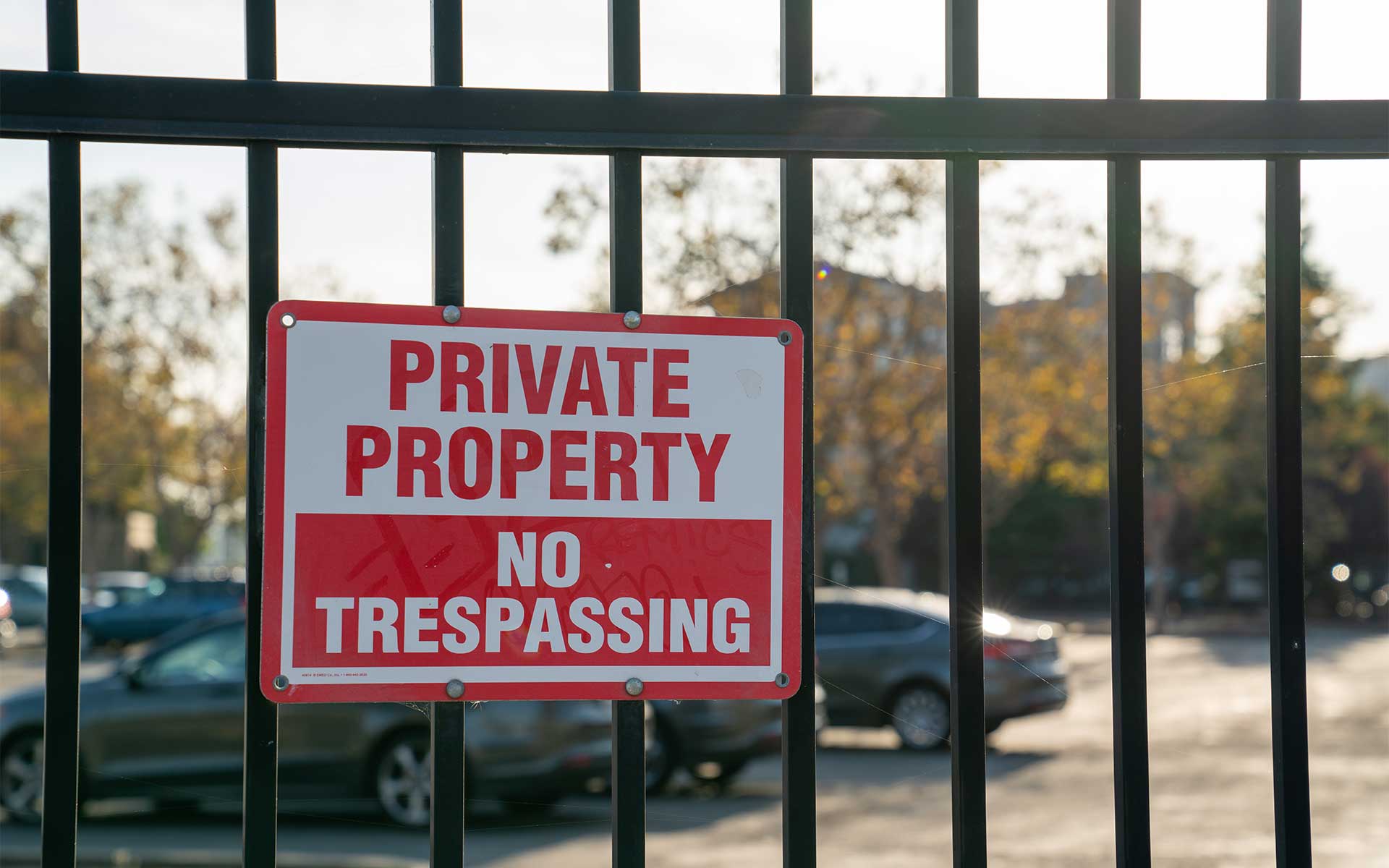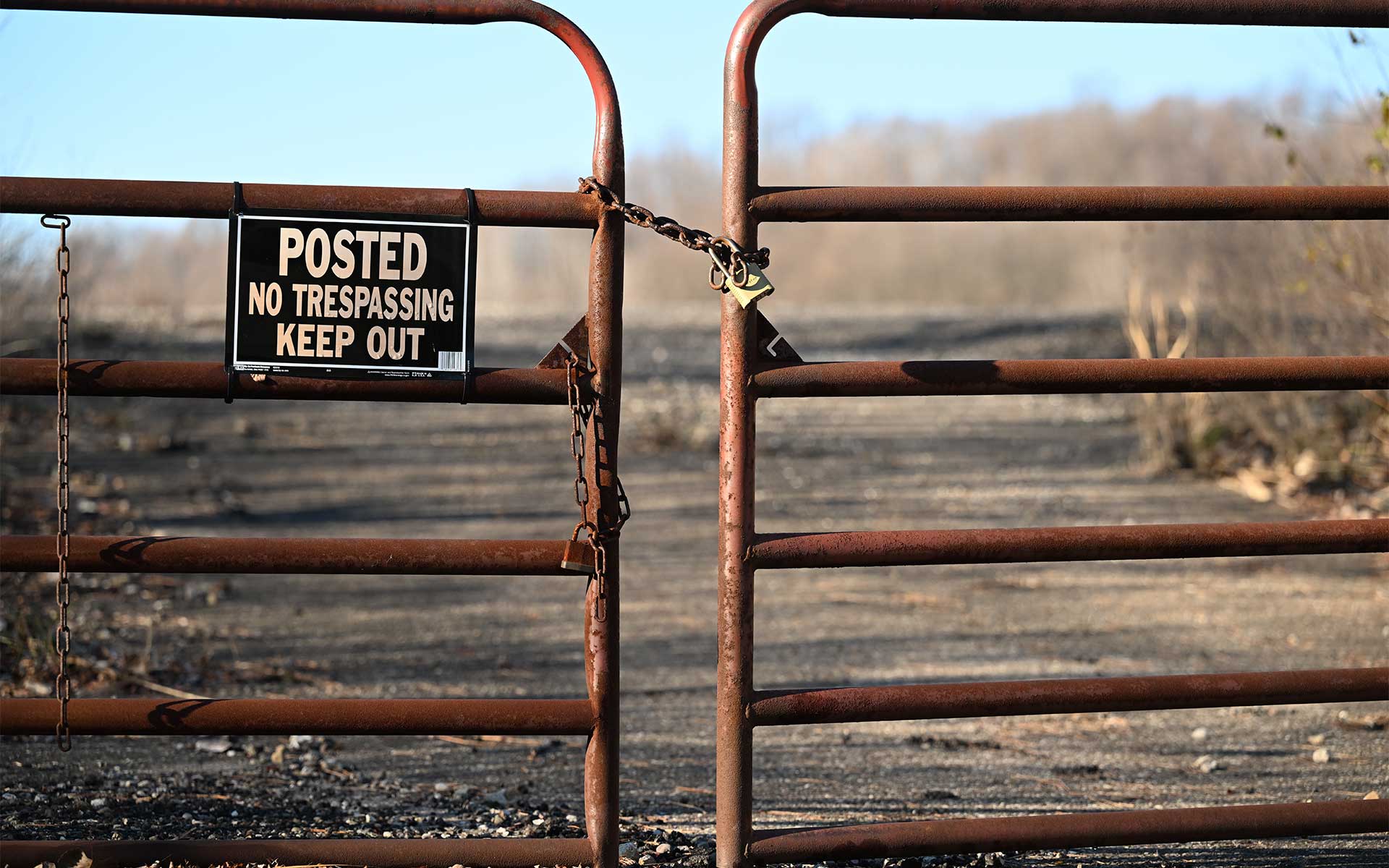
You’ve probably spotted those “No Trespassing” signs and wondered exactly what they mean – spoiler alert: it’s not just about keeping off someone’s perfectly manicured lawn.
In this blog, we will cover the criminal trespassing laws in the State of Texas to ensure that you understand the legal implications of going where you don’t belong.
Let’s face it; even the most well intentioned citizens have taken a wrong turn or two onto places they shouldn’t be. But here in Texas, stumbling onto private land without permission isn’t just frowned upon—it could hit your wallet with fines all the way up to $2,000!
Read on to see what really counts as criminal trespassing so that you won’t find yourself inadvertently breaking the law.
Key Takeaways
- Criminal trespassing in Texas means being on someone’s property after clear warnings like signs, fences, or purple paint. It can lead to fines up to $2,000 and jail time.
- Warnings for trespassing don’t go on your record in Texas but getting caught does and can impact jobs and school applications.
- The law takes intent into account; if you ignore warnings, it’s worse than accidentally wandering onto private property.
- GHC Law Firm offers legal help if you’re charged with criminal trespassing in Texas. They work towards the best outcome for your case.
- There are different levels of penalties: Class B misdemeanors may result in 180 days of jail time while Class C could mean a year behind bars plus fines.
Understanding Criminal Trespassing in Texas
When we talk about criminal trespassing in Texas, it’s not just a simple case of being where you shouldn’t. There are specific elements that elevate an innocent mistake to a legal offense; understanding these nuances is key to navigating the wide-open spaces and private properties within the Lone Star State.
Definition of Criminal Trespassing
Criminal trespassing means you go into or stay on someone’s property after being told not to. In Texas, this is a big deal. If signs are up, fences are built, purple paint marks are clear, or crops are growing and you still walk onto the land, it’s criminal trespassing.
It’s not just walking onto property; it’s ignoring warnings and staying without permission. This can get you in trouble with the law.
Say someone has a fence around their land with “No Trespassing” signs all over. If you climb that fence and go inside, that’s criminal trespassing according to Texas Penal Code 30.05.
You’re breaking the rules if there was any kind of clear sign or warning telling you to keep out and you didn’t listen.
Differentiation From Regular Trespassing
Sometimes folks think all types of trespassing are the same. They’re not! In Texas, criminal trespassing happens on purpose. It means a person knows they’re not supposed to be somewhere but decide to go there anyway.
Regular trespass might be accidental, like walking onto someone’s land without knowing it’s private.
We need to know the difference because it affects how the law sees things. If someone just stumbles onto property by mistake, that’s different from ignoring signs or fences and going in anyway.
The law is harder on people who do things with intent. That’s why Texas looks closely at what was going through a person’s mind when they entered a place they shouldn’t have been.
Issuing a Criminal Trespass Warning in Texas
Before we dive deeper, let’s touch on the process of issuing a criminal trespass warning in Texas. This is where things get serious—once you’ve been warned, stepping over the line can lead to real legal consequences.
We’ll guide you through who has the power to warn off intruders and how they can do it legally. Stay tuned as we unfold how a piece of paper can become your not-so-friendly reminder that you’re unwelcome.
Methods of Issuing a Warning
We can use different ways to let someone know they’re not allowed on a property. One way is by telling them directly or putting it in writing. We can also put up signs, paint the trees with purple marks, or have a fence around the land.
If there are crops growing, that’s another clear sign people should stay off.
Property owners and others like police officers or renters can give these warnings. It’s important to make sure the warning is clear so everyone understands they need to stay away from that area.
Individuals Authorized to Issue a Warning
In Texas, several people can warn someone about criminal trespassing. Property owners have the right to tell others they cannot come onto their land. If the owner isn’t there, the person in charge at the time can do this too.
Attorneys working for the owner also have this power.
Police officers help keep places safe and they can give warnings as well. Neighbors looking out for each other’s properties might issue a warning if needed. Tenants living on leased property have the authority to tell others not to trespass just like owners do.
All these individuals play a role in preventing unauthorized access and keeping private property secure.
Penalties for Criminal Trespassing in Texas

When you step over the line in Texas, criminal trespassing charges aren’t something to take lightly. We’re talking about real consequences that can ripple through your life, from fines to time behind bars.
Let’s delve into what these penalties entail and why it’s crucial to understand the weight of a trespassing charge in the Lone Star State.
Class B Misdemeanor Consequences
If we get caught for criminal trespassing in Texas, and it’s a Class B misdemeanor, we could be looking at serious trouble. We might have to pay up to $2,000 in fines. That’s not all; there’s also the risk of spending as much as 180 days behind bars.
Getting tagged with this offense is no small deal – it means time away from family, work, and daily life.
Dealing with jail time can turn our lives upside down. It can mean losing a job or having trouble finding a new one later on. We must take these consequences seriously because they have long-lasting effects that go way beyond just paying a fine or spending time in jail.
Class C Misdemeanor Consequences
We might not think much of a Class C misdemeanor, but in Texas, the consequences are still serious. You could get slapped with a fine up to $4,000. That’s not pocket change! And if you’re caught trespassing with a deadly weapon or on farmland, it counts as the same kind of offense.
Imagine having to spend an entire year in jail for criminal trespassing. This isn’t just a slap on the wrist; it’s possible jail time we’re talking about. Yes, that’s right – even for a Class C misdemeanor, offenders may face jail time up to one year.
So we always stress how important it is to respect property limits and laws in Texas to avoid these tough penalties.
Impact of Criminal Trespassing on Record
We often don’t consider the long-term effects a brush with the law can have, but getting convicted of criminal trespass in Texas isn’t something to take lightly. It leaves a mark that can trail behind you for years, affecting future job prospects, housing applications, and even educational opportunities – turning what seemed like a minor infraction into an obstacle course for life’s endeavors.
No Record for Warning
We need to clear up a common worry about criminal trespass warnings in Texas. They don’t mark your record. Many folks stress over warnings thinking they’ll haunt them forever, but that’s not the case here.
If you get a warning for stepping onto someone else’s property without permission, breathe easy knowing it won’t stick around on any public file.
Getting warned is serious, but it doesn’t mean you’ve got a criminal history all of a sudden. Police or property owners can tell you to leave without creating lasting problems for you.
It means stay off the land unless given okay by the owner later on. But remember, if things go further than just a warning and end with an arrest, that could lead to more trouble and potentially impact your record down the line.
Potential Impact on Criminal History for Conviction
Getting convicted for criminal trespassing in Texas can mark your record. This stain on your history might cause trouble when you look for jobs or apply to schools. Employers and admissions offices often check backgrounds.
If they see a conviction, it could hurt your chances.
A marked record also affects your trustworthiness in legal matters. If you’re involved in court again, the judge may consider your past crimes. Your criminal defense lawyer will work hard to minimize these impacts.
They might help clear up misunderstandings about the events leading to arrest.
Having a conviction expunged is another option down the road if you meet certain conditions. Until then, we stay aware of how this blot on our record changes life’s course and strive to keep clean slates moving forward.
Legal Assistance for Criminal Trespassing Cases in Texas
We understand how daunting navigating the legal system can be, especially when facing charges like criminal trespassing in Texas. That’s why reaching out to a knowledgeable criminal defense attorney, such as those at GHC Law Firm, is crucial for protecting your rights and building a strong defense.
Contacting GHC Law Firm for Professional Assistance
If you’re caught up in a criminal trespassing case, reach out to GHC Law Firm, where we tackle Texas trespassing laws with expertise and provide the guidance you need.
Our team understands how these cases can affect your life.
Trust us to dig into the facts and defend your rights effectively. At GHC Law Firm, we stand by your side every step of the way, from initial warnings to court appearances if needed.
We aim for outcomes that will have minimal impact on your future.
Conclusion
In Texas, entering someone’s land without permission is criminal trespassing. Remember, it’s bad to stay on the property when told to leave. Getting a warning doesn’t go on your record, but being caught does.
If you’re facing charges, GHC Law Firm can help. Knowing these laws keeps us out of trouble and safe from harsh fines or jail time. Let’s make sure we respect others’ property and stay informed!
Contact GHC Law Firm Today
FAQs
1. What is criminal trespassing in Texas?
Criminal trespass in Texas means going onto someone else’s land or property without permission. It can be as serious as a Class A misdemeanor, especially on agricultural land.
2. What might happen if I'm caught trespassing?
If caught, you could get arrested by peace officers and face penalties like time in county jail or fines. For certain places, like critical infrastructure facilities, the punishment can be even tougher.
3. Can I ever go on private property legally?
Yes, but only with effective consent from the owner or if you have a specific license to carry out an activity there—like cultivation of visible crops.
4. What does "deferred adjudication" mean for trespassers?
Deferred adjudication means that instead of getting a jail sentence right away for your offense against property, the court gives you probation and your case gets dismissed if you follow all the rules set by your probation officer.
5. Is walking through someone's field just to look at crops considered theft?
Not exactly; while taking anything would be stealing, simply walking without causing harm isn’t theft—it’s trespass unless you got permission from the landlord.
6. If it's my first time getting caught for criminal trespassing will I go to jail?
You may not necessarily do jail time for a first offense if it’s minor like class C misdemeanors; however each case is different and factors such as past criminal records could influence the outcome so talking to a criminal lawyer could help understand better.


